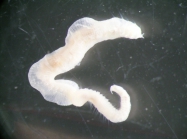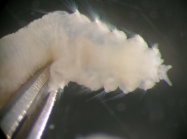WoRMS taxon details
Sclerocheilus Grube, 1863
129557 (urn:lsid:marinespecies.org:taxname:129557)
accepted
Genus
- Species Sclerocheilus antarcticus Ashworth, 1915
- Species Sclerocheilus deriugini Zachs, 1925
- Species Sclerocheilus minutus Grube, 1863
- Species Sclerocheilus unoculus Kudenov, 1985
- Species Sclerocheilus acirratus Hartman, 1966 accepted as Asclerocheilus acirratus (Hartman, 1966) (superseded original combination)
- Species Sclerocheilus caecus Saint-Joseph, 1885 accepted as Asclerocheilus intermedius (Saint-Joseph, 1894) (subjective synonym)
- Species Sclerocheilus oculatus (Ehlers, 1901) accepted as Hyboscolex oculatus (Ehlers, 1901)
- Species Sclerocheilus pacificus Moore, 1909 accepted as Hyboscolex pacificus (Moore, 1909) (superseded original combination)
marine, brackish, fresh, terrestrial
recent only
masculine
Grube, A.E. (1863). Beschreibung neuer oder wenig bekannter Anneliden. Sechster Beitrag. <em>Archiv für Naturgeschichte, Berlin.</em> 29: 37-69, and plates 4-6., available online at https://biodiversitylibrary.org/page/7071934
page(s): 50 [details]
page(s): 50 [details]
Note Sclerocheilus minutus Grube, 1863
From editor or global species database
Type species Sclerocheilus minutus Grube, 1863 [details]
Etymology The generic name is a composition of the words Sclero, 'hard', and Cheilus, 'lips' or 'rim'. Greek 'cheilos' is neuter...
Etymology The generic name is a composition of the words Sclero, 'hard', and Cheilus, 'lips' or 'rim'. Greek 'cheilos' is neuter (fide Brown, 1956: 486), and likewise Cheilus (not in Latin dictionaries) but Grube has made a compound word as Sclerocheilus which he treats as masculine by using a masculine adjective with it for his type species Sclerocheilus minutus Grube, 1863. The scalibregmatid genera Sclerocheilus Grube 1863 and Asclerocheilus Ashworth 1901 look masculine, and taxonomists have treated them as such. Addition of the Greek 'A' by Ashworth for Asclerocheilus is a negative, thus meaning not with hard lips/rim, but his short diagnosis has nothing that fits that character state. In contrast Brown (1954: 486) treated cheilus/chelus names as neuter, but in WoRMS -cheilus genera names overwhelmingly are treated as masculine genera. Thus Sclerocheilus is treated as masculine here. [details]
Read, G.; Fauchald, K. (Ed.) (2025). World Polychaeta Database. Sclerocheilus Grube, 1863. Accessed through: World Register of Marine Species at: https://www.marinespecies.org/aphia.php?p=taxdetails&id=129557 on 2025-07-13
Date
action
by
![]() The webpage text is licensed under a Creative Commons
Attribution 4.0 License
The webpage text is licensed under a Creative Commons
Attribution 4.0 License
Nomenclature
original description
Grube, A.E. (1863). Beschreibung neuer oder wenig bekannter Anneliden. Sechster Beitrag. <em>Archiv für Naturgeschichte, Berlin.</em> 29: 37-69, and plates 4-6., available online at https://biodiversitylibrary.org/page/7071934
page(s): 50 [details]
page(s): 50 [details]
Other
additional source
Fauchald, K. (1977). The polychaete worms, definitions and keys to the orders, families and genera. <em>Natural History Museum of Los Angeles County: Los Angeles, CA (USA), Science Series.</em> 28:1-188., available online at http://www.vliz.be/imisdocs/publications/123110.pdf [details]
additional source Bellan, G. (2001). Polychaeta, <i>in</i>: Costello, M.J. <i>et al.</i> (Ed.) (2001). European register of marine species: a check-list of the marine species in Europe and a bibliography of guides to their identification. <em>Collection Patrimoines Naturels.</em> 50: 214-231. (look up in IMIS) [details]
additional source Bellan, G. (2001). Polychaeta, <i>in</i>: Costello, M.J. <i>et al.</i> (Ed.) (2001). European register of marine species: a check-list of the marine species in Europe and a bibliography of guides to their identification. <em>Collection Patrimoines Naturels.</em> 50: 214-231. (look up in IMIS) [details]
 Present
Present  Inaccurate
Inaccurate  Introduced: alien
Introduced: alien  Containing type locality
Containing type locality
From editor or global species database
Diagnosis Body elongated, prostomium T-shaped; one asetigerous segment present. Branchiae absent; ventral cirri present on posterior setigers; dorsal cirri absent. Acicular spines, furcate and capillary setae present. [details]Etymology The generic name is a composition of the words Sclero, 'hard', and Cheilus, 'lips' or 'rim'. Greek 'cheilos' is neuter (fide Brown, 1956: 486), and likewise Cheilus (not in Latin dictionaries) but Grube has made a compound word as Sclerocheilus which he treats as masculine by using a masculine adjective with it for his type species Sclerocheilus minutus Grube, 1863. The scalibregmatid genera Sclerocheilus Grube 1863 and Asclerocheilus Ashworth 1901 look masculine, and taxonomists have treated them as such. Addition of the Greek 'A' by Ashworth for Asclerocheilus is a negative, thus meaning not with hard lips/rim, but his short diagnosis has nothing that fits that character state. In contrast Brown (1954: 486) treated cheilus/chelus names as neuter, but in WoRMS -cheilus genera names overwhelmingly are treated as masculine genera. Thus Sclerocheilus is treated as masculine here. [details]
Grammatical gender Cheilus' (cheilos) could be neuter, but Grube treated it as masculine, as did following authors and the authors of many other cheilus genera. [details]
Type species Sclerocheilus minutus Grube, 1863 [details]


